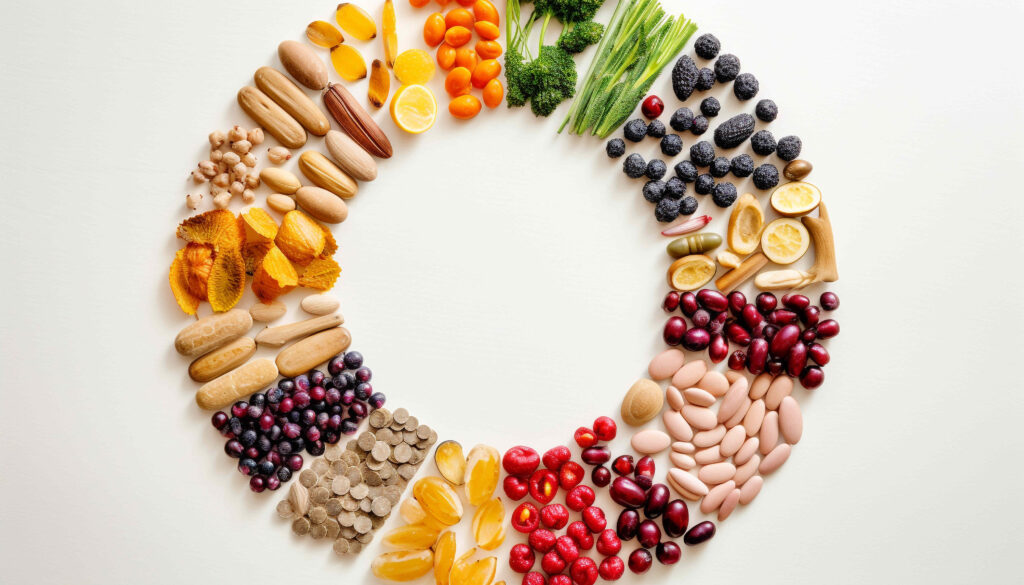6 Foods High in Soluble Fiber for Your Gut Health

Your gut is home to trillions of microbes — tiny bacteria, fungi, and other organisms that influence everything from digestion to immunity and even mood. Keeping them healthy requires one key nutrient that many people overlook: soluble fiber.
Unlike insoluble fiber, which helps keep things moving through the digestive tract, soluble fiber dissolves in water and forms a gel-like substance in the gut. This gel slows digestion, stabilizes blood sugar, binds cholesterol, and — perhaps most importantly — feeds your gut bacteria.
When gut bacteria ferment soluble fiber, they produce short-chain fatty acids (SCFAs) like butyrate and propionate, which lower inflammation, strengthen the intestinal barrier, and support a balanced microbiome.
Unfortunately, most people consume far less than the recommended daily amount of fiber. On average, adults only eat about 15–17 grams per day — roughly half of what’s ideal for optimal gut function.
The good news? Adding soluble-fiber-rich foods is one of the easiest and most effective ways to restore digestive balance and support overall well-being. Let’s explore six foods that deliver the most benefit.

1. Oats — The Gut-Loving Classic
If there’s one food synonymous with digestive health, it’s oats. Rich in beta-glucan, a form of soluble fiber, oats have been studied extensively for their cholesterol-lowering and immune-supporting effects.
But beta-glucan also acts as a prebiotic, providing fuel for beneficial bacteria such as Bifidobacterium and Lactobacillus species. These microbes, in turn, produce SCFAs that help reduce gut inflammation and regulate bowel function.
Regular oat consumption has also been linked to lower LDL (“bad”) cholesterol, improved insulin sensitivity, and enhanced satiety — all factors that indirectly support gut and metabolic health.
To get the most from your oats:
- Choose steel-cut or rolled oats rather than instant, as they contain more intact fiber.
- Add nuts, seeds, and fruit for additional prebiotics and antioxidants.
- Try oat bran as a high-fiber base in smoothies, muffins, or pancakes.
2. Apples — Nature’s Prebiotic Fruit
The phrase “an apple a day keeps the doctor away” might also apply to your gut bacteria. Apples are rich in pectin, a form of soluble fiber that transforms into a gentle gel during digestion.
Pectin serves as a prebiotic substrate, nourishing gut microbes and encouraging the growth of beneficial strains while suppressing potentially harmful ones. As these microbes ferment pectin, they release SCFAs that help maintain gut barrier integrity and reduce systemic inflammation.
Interestingly, apple polyphenols — natural plant compounds concentrated in the peel — also work synergistically with pectin to promote microbial diversity and antioxidant protection. So, keep the peel on for maximum benefit.
Practical ways to enjoy apples:
- Slice raw apples into oatmeal or salads for crunch and fiber.
- Bake them with cinnamon for a warm, digestion-friendly dessert.
- Blend them into smoothies with oats and yogurt for a prebiotic boost.
3. Lentils and Chickpeas — Fiber-Rich Powerhouses
Legumes like lentils and chickpeas are nutritional multitaskers — loaded with protein, minerals, and both types of dietary fiber. The soluble fiber in legumes slows digestion and provides long-lasting fuel for the gut microbiome, while the insoluble fiber adds bulk and promotes regularity.
Soluble fiber from legumes is especially good at stimulating the production of butyrate, one of the most beneficial SCFAs for gut and colon health. Butyrate helps repair the gut lining, strengthens the immune system, and may even improve mood regulation through the gut-brain axis.
How to include more legumes:
- Add lentils to soups and curries.
- Toss chickpeas onto salads or roast them for a crispy snack.
- Blend cooked beans into dips like hummus for a gut-friendly appetizer.
Because they are also high in resistant starch, legumes continue to feed gut microbes even after digestion — providing sustained nourishment to your microbiome.
4. Avocados — Fiber and Healthy Fats in One Package
Beyond being a social media darling, avocados are one of the few foods that combine soluble fiber, healthy fats, and antioxidants in a single package.
A medium avocado contains about 3 grams of soluble fiber and 10 grams of total fiber, along with monounsaturated fats that help reduce inflammation and support nutrient absorption.
Soluble fiber in avocados serves as a slow-digesting prebiotic, while their natural fats promote the growth of bacteria that produce butyrate and acetate — the same SCFAs linked to improved gut and immune function.
A study published in The Journal of Nutrition found that daily avocado consumption increased microbial diversity and the abundance of fiber-fermenting bacteria associated with better gut health (Oxford Academic, 2021).
Simple ways to eat more avocados:
- Spread mashed avocado on whole-grain toast.
- Add slices to grain bowls or tacos.
- Blend into smoothies for creaminess and healthy fats.

5. Flaxseeds — Small but Mighty for Gut Function
Flaxseeds are tiny nutritional powerhouses that deliver a unique blend of soluble and insoluble fiber, omega-3 fatty acids, and plant lignans — compounds with antioxidant and anti-inflammatory effects.
The soluble fiber in flaxseed helps stabilize digestion, reduce constipation, and feed beneficial bacteria in the large intestine. Meanwhile, its insoluble fiber adds bulk to stool and supports motility.
Ground flaxseed (rather than whole seeds) is best, since it’s easier for your body to digest and absorb. Try adding a tablespoon or two to oatmeal, yogurt, or baked goods.
Flaxseed also provides alpha-linolenic acid (ALA), a plant-based omega-3 fatty acid that has been shown to reduce inflammatory markers and improve intestinal barrier function. Together, fiber and ALA make flaxseed one of the best natural foods for gut maintenance.

6. Carrots — A Gentle Source of Soluble Fiber
Carrots are often underestimated when it comes to fiber content, but they provide a steady dose of soluble pectin that benefits both digestion and blood sugar control.
The soluble fiber in carrots slows the absorption of glucose, promoting more balanced energy levels while supporting gut microbial fermentation. Additionally, their antioxidants — particularly beta-carotene — help reduce oxidative stress, which benefits both the skin and the digestive lining.
Carrots are also incredibly versatile:
- Snack on raw carrot sticks.
- Roast them to enhance sweetness.
- Add shredded carrots to salads or muffins for color and crunch.
Their gentle fiber profile makes them ideal for people with sensitive digestion or those just starting to increase their fiber intake.
The Gut Microbiome: Why Soluble Fiber Matters
Soluble fiber doesn’t just help you stay regular — it’s the main food source for your gut microbes. When fermented, fiber produces short-chain fatty acids (SCFAs) like butyrate, propionate, and acetate, which help strengthen the intestinal wall, regulate inflammation, and support balanced metabolism. These same compounds also influence brain function and mood regulation, showing how closely digestion and mental wellbeing are connected.
As explained by Bioma Health’s Gut Health insights, a thriving microbiome acts like an internal pharmacy — producing beneficial compounds your body relies on for repair, immune function, and hormonal balance. Without enough soluble fiber, beneficial bacteria lose their fuel source, allowing harmful microbes to take over and potentially leading to inflammation, digestive discomfort, or even metabolic disorders. The simplest and most natural way to protect your microbiome is by eating a diverse range of fiber-rich foods every day.

Building a Gut-Friendly Lifestyle
Adding soluble fiber is a powerful start, but lasting gut health depends on overall lifestyle consistency. Here are key practices to complement your fiber-rich diet:
- Eat a wide range of plant foods — Aim for at least 30 different plant types per week. Variety supports microbial diversity.
- Stay hydrated — Soluble fiber needs water to do its job effectively.
- Manage stress — Chronic stress can alter your gut microbiota within days. Mindfulness, yoga, or light exercise can help.
- Sleep well — The gut microbiome follows a circadian rhythm; irregular sleep can disrupt microbial balance.
- Move daily — Physical activity stimulates digestion and supports microbial diversity.
Together, these habits form the foundation of a balanced gut — one that supports immunity, energy, and mood just as much as digestion.
Nourish Your Gut, Transform Your Health
Soluble fiber is one of the most underrated tools for better gut health. By eating more foods like oats, apples, lentils, avocados, flaxseeds, and carrots, you can feed beneficial bacteria, improve digestion, and strengthen your gut barrier naturally.
When your gut thrives, so does your whole body — from clearer skin to steadier energy and sharper focus. It’s a reminder that small, consistent dietary choices have powerful effects over time.
To explore how gut health connects to mood, metabolism, and immunity, visit Bioma Health’s Gut Health resources — where nutrition meets science for better living.

Related articles






